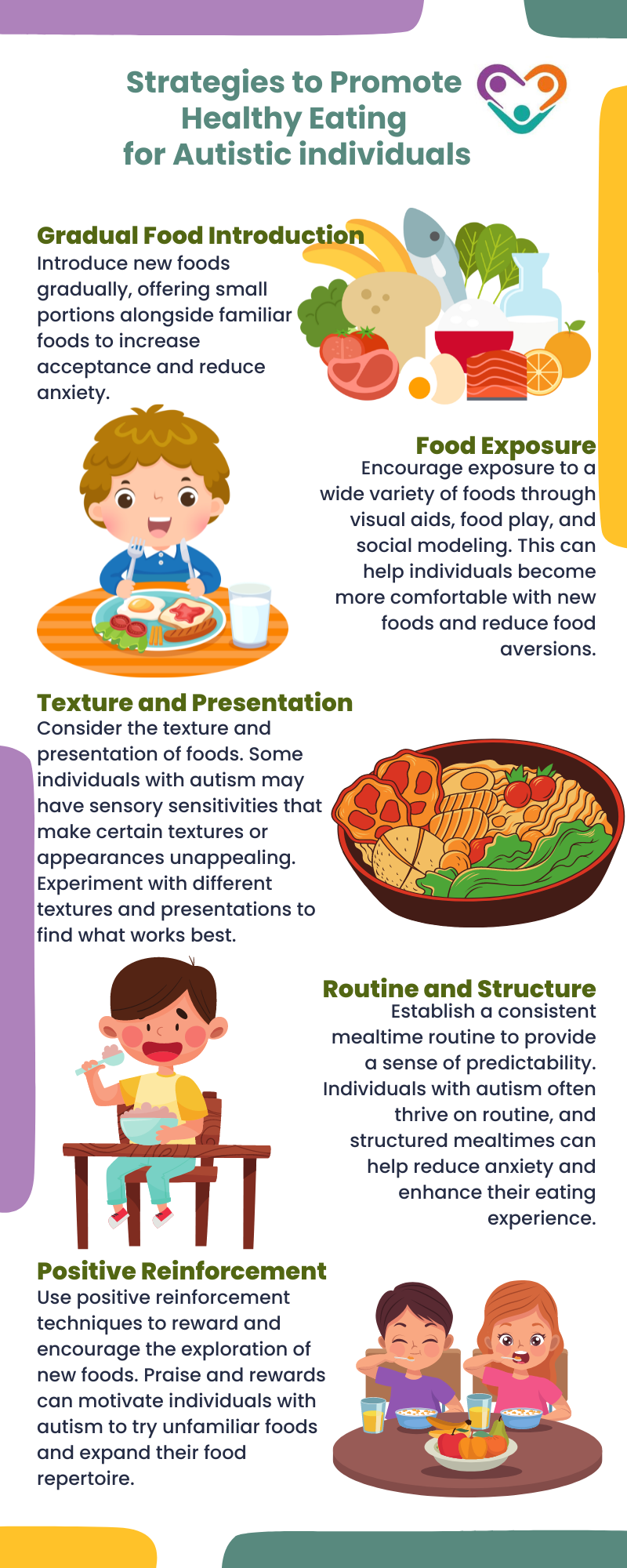Children with autism may exhibit restrictive and ritualistic behaviors that affect their eating habits. This can lead to nutritional deficiencies, weight loss, malnutrition, and inadequate growth.
Also, they often have specific food preferences and may gravitate towards foods that are high in carbohydrates and calories while being low in fiber. This can interfere with gut function and contribute to issues such as constipation.
Additionally, gastrointestinal (GI) issues are commonly associated with autism, including chronic constipation or diarrhea, as well as irritable and inflammatory bowel conditions.

Selective Eating Behaviors
Selective eating behaviors are frequently observed in children with autism. These behaviors may manifest as a fear of new foods or a strong aversion to certain textures, smells, or tastes. As a result, children with autism may develop inappropriate behaviors to avoid unfamiliar or disliked foods. This can include refusing to use certain utensils or sit at the table during mealtime.
In some cases, children with autism who have feeding problems may severely limit their food choices. It is not uncommon for these individuals to restrict themselves to five foods or fewer. This extreme selectivity can be significantly different from the typical eating patterns of children without autism.
Factors Influencing Food Choices
There are various factors that can influence an autistic individual’s food choices. Here are two of the most significant ones:
Sensory Processing Challenges
Mealtime challenges for individuals with autism can often be strongly related to how their sensory system processes information. Many autistic individuals have heightened sensitivities to sound, smell, taste, touch, temperature, and movement. Approximately three-quarters of autistic children also have sensory processing disorder (SPD).
These sensory sensitivities can make it challenging for individuals with autism to tolerate certain textures, flavors, and even the sounds and smells associated with food. This can lead to a limited variety of foods that they are willing to eat, which can impact their overall nutrition and growth.
Oral-Motor Difficulties
Neurodivergent individuals, including those with autism, may also experience oral-motor difficulties. These difficulties refer to challenges in coordinating the movements required to bite, chew, and swallow foods.
Research has shown that 81% of individuals with autism demonstrate a high occurrence of oral-motor difficulties.
These oral-motor difficulties can manifest in various ways, such as having difficulty chewing food properly, gagging easily, or struggling to swallow certain textures. As a result, individuals with autism may exhibit aversions to certain foods or have difficulties consuming them, which can impact their overall feeding experience.
It’s important to note that these factors can vary from person to person, and individuals with autism may experience a combination of sensory processing challenges and oral-motor difficulties. Understanding these factors can help make parenting an autistic child easier as it can make it easier to find appropriate strategies and interventions to support your child in their feeding journey.

Medical Conditions and Feeding
Medical conditions can also impact the feeding habits and overall nutritional status of autistic individuals. Among the most common medical conditions associated with autism are gastrointestinal issues.
These GI issues can range from chronic constipation or diarrhea to irritable and inflammatory bowel conditions. The presence of these conditions can have a significant impact on a child’s feeding status.
GI issues are prevalent among individuals with autism, and they can contribute to feeding difficulties. These issues may include chronic constipation, diarrhea, or other bowel conditions. The discomfort and pain associated with these conditions can affect a child’s appetite and willingness to eat.
As such, parents and caregivers should be aware of these GI issues and work closely with healthcare professionals to manage them effectively.

Impact on Feeding Status
Children with autism often experience more feeding problems than their peers. These problems can include food refusal, limited variety of food, single food intake, or even a preference for a liquid diet. They may exhibit these dysfunctional behaviors at mealtime due to various factors, including medical and sensory challenges or behavioral issues.
Therefore, it is crucial to conduct a thorough assessment to develop an effective clinical intervention.
Research has shown that children with autism consume less fruit, dairy products, vegetables, proteins, and starch compared to children without a diagnosis. They often have preferences for specific consistencies of food and are more resistant to trying new foods. These preferences and restrictions in food variety can significantly impact their overall nutrition.
A study conducted with children aged three to five found that children with ASD, compared to typically developing children, exhibited preferences for foods with specific consistencies, were more selective in their food choices, and were more hesitant to try new foods.
This restricted variety of food intake can affect their overall nutrient intake and hinder their ability to meet their nutritional needs.
Furthermore, studies have indicated that children with autism tend to persist in food selectivity into adolescence. While there may be some improvement in food refusal, the increase in food repertoire (number of unique foods eaten) remains limited. This highlights the importance of early interventions to address food selectivity and promote healthy eating habits among children with ASD.

Long-Term Effects and Interventions
It’s important to consider the long-term effects and interventions that can help address the challenges faced by individuals with autism. There are two key aspects to focus on in this case which are as follows:
Persistence of Food Selectivity
While food refusal among autistic children may improve overall, there is often no significant increase in the variety of foods consumed. This can lead to limited nutritional intake and potential deficiencies.
Interventions early in childhood are crucial to increase the variety of foods accepted and promote a more balanced diet among individuals with ASD.
It is important to note that food selectivity can vary in severity among individuals with autism. Some may exhibit mild picky eating habits, while others may severely restrict their diets to only a few specific foods. Understanding the level of food selectivity is essential in developing effective interventions.
Promoting Healthy Eating Practices
Promoting healthy eating practices in individuals with autism is essential for their overall well-being.
Autistic children often have preferences for foods that are high in carbohydrates and calories while low in fiber. This can lead to gastrointestinal issues and constipation. It is crucial to encourage a diverse and balanced diet to ensure adequate nutrient intake and support optimal gut function.
Here are some strategies to promote healthy eating practices for individuals with autism:

By addressing the persistence of food selectivity and promoting healthy eating practices, parents and caregivers can help individuals with autism develop a more varied and nutritious diet. It is crucial to work closely with healthcare professionals, such as dieticians and behavioral therapists, to tailor interventions to the specific needs of each individual.
With early intervention and support, individuals with autism can develop healthier eating habits, leading to improved nutrition and overall well-being.
Sources:
https://www.autismspeaks.org/sites/default/files/2018-08/Exploring%20Feeding%20Behavior.pdf
https://www.ncbi.nlm.nih.gov/pmc/articles/PMC10048794
https://www.feedingplus.com/blog/Autism-Spectrum-Disorder-ASD-and-Feeding



